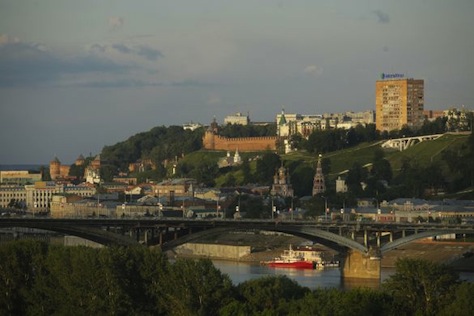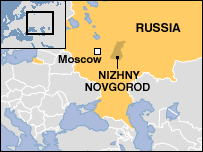 Photo credit to The Moscow Times.
Photo credit to The Moscow Times.
In the aftermath of Boris Nemtsov’s shocking assassination, his friends in Russia and abroad are remembering him primarily for his role as a liberal opposition leader in the Putin era and for his short-lived tenure as first deputy prime minister under former Russian president Boris Yeltsin. ![]()
![]()
Nemstov’s appointment as deputy prime minister lasted just four months, however, when Yeltsin dismissed him and other top government officials in the tempest of the 1998 ruble crisis. It was a sharp fall for someone that even Yeltsin hinted might one day be his successor.
Instead, Nemtsov’s more enduring legacy in Russian government involves the six years he spent as the first post-Soviet governor of Nizhny Novgorod oblast in the Russian heartland that lies hundreds of miles to the east of Moscow — it lies north of the Caucuses and the Turkish-Iranian border.
* * * * *
RELATED: Nemtsov’s shocking assassination rocks Moscow
* * * * *
The oblast is home to Nizhny Novgorod, once Russia’s third city after Moscow and St. Petersburg. Named Gorky (after the writer Maxim Gorky) from 1932 until the fall of the Soviet Union, it plays an important, if shrinking, role as a hub for the Russian industrial heartland. The city, which rests at the point where the Volga river meets the Oka river, dates to the 13th century. During the Soviet era, it was a center of military activity and, accordingly, foreigners were prohibited from visiting the city. With the collapse of the Soviet Union, however, Nizhny opened both to tourists and capitalists alike.
Nemtsov, a bright and charismatic physicist who first engaged public policy in protest over the nuclear disaster at Chernobyl, was appointed Nizhny Novgorod’s governor in November 1991. In December 1995, when Russia was still an emerging democracy (and not a failing democracy, or a puppet democracy or an outright autocracy), Nemtsov was reelected at a time when privatization and liberalism had become so unpopular that Yeltsin himself was struggling politically to defeat communist and ultra-nationalists.
As governor, Nemtsov enthusiastically embraced the wave of liberal reforms that Yeltsin and Anatoly Chubais, first deputy prime minister before Nemtsov, were introducing across the country. Unfortunately, however, those policies also caused massive economic dislocation and cultural disorientation. Nevertheless, Nemtsov won praise from free-market advocates like former British prime minister Margaret Thatcher and from Western bankers keen on the investment opportunities in a newly opened Russia. He was close not only to the young group of market-oriented reformers in government, but also to opposition liberals, most notably the liberal, pro-democratic ‘Yabloko’ bloc, then led by Grigory Yavlinsky, who advised Nemtsov on economic reforms in Nizhny Novgorod and who remains the intellectual godfather of the Russian opposition movement (here’s a recent interview with Novaya Gazeta).
In his book Resurrection: The Struggle for a New Russia, the inimitable David Remnick writes that Nizhny Novgorod was a bright star in the Russia of the 1990s:
Beyond Moscow, the most encouraging region is centered around Nizhny Novgorod, where young and progressive politicians like Boris Nemtsov have made good on their promises to create ‘capitalism in one country.’ One of the biggest problems with the Soviet economy was that it was so heavily militarized; Nizhny Novgorod, the third-largest city in the country, has been one of the most militarized of all. And yet not only has the city managed, through privatization, demonopolization, and bond issues, to create thriving service and production economies, it has also managed to convert 90 percent of its collective farms to private hands.
But today, Nizhny is a case study in just about everything that’s wrong with the country — a confluence of the economic, environmental and demographic tragedies that are afflicting Russia in the 21st century. The oblast’s population has fallen from 3.71 million in 1989 to just 3.31 million in 2010, and the city is shrinking by around 15,000 annually as the death rate far exceeds the birth rate. Nizhny is now the fifth-most populous city, eclipsed by cities like Novosibirsk in Asian Russia.
As the prolific writer Anna Nemtsova (no relation to Nemtsov) has chronicled, her home city of Nizhny is not only one of the fastest shrinking cities in Russia, it’s one of the fastest shrinking cities in the world:
In 2014, [Nizhny] achieved an unenviable distinction: in the first six months of the year, 26,350 people died and only 18,700 babies were born – the population of Nizhny shrunk by 7,600 people in six months, its highest ever death rate. No bombs fell on the city during the period, no epidemics hit, no natural disasters struck its population. For the past two years Nizhny had been the fifth fastest shrinking city in the world.
In Siberia, of all places, cities like Novosibirsk and Krasnoyarsk are growing, even while Nizhny is failing. That’s not all Nemtsov’s fault who, after all, hadn’t been responsible for its government in nearly two decades. Moreover, as grim as Nizhny now appears today, it might have been even worse without the effects of Nemtsov’s shock therapy in the 1990s.
Nemtsova also writes about the city’s current mayor, whose wife spends much of her time in southern France. Valery Shantsev, the oblast governor since 2005 (one year after the Kremlin ruled that governors will be appointed directly and not elected) previously served for a decade as a former deputy mayor of Moscow under the fabulously corrupt Yuri Luzkhov.
Even as the region’s current leaders seem more like neo-feudalist, criminal vassals of Putin’s Kremlin, it’s clear that Nemtsov, in the 1990s, fell short of the economic miracle he was trying to achieve, and it’s important not to omit that failure from his legacy. It will be tempting now to remember Nemtsov for all his qualities as an opposition leader since the rise of Vladimir Putin, to paint him in broad strokes as a pro-democracy, pro-reform dissident and a man of principle. Nemtsov, of course, was all of those things.
But it’s not quite that simple, because he shares responsibility for the wave of creative destruction unleashed throughout the Russian economy in the 1990s. Even if the Yeltsin-Chubais-Nemtsov reforms were a necessary step in Russia’s transition from a top-down communist state, they engendered economic suffering unknown to Russia for decades, scars that still afflict Russian collective memory today. The failure, in aggregate, of the reformers to establish broad-based economic prosperity, and the even more damning perception that they created a new class of oligarchic robber-barons set the conditions for Russia’s slow march back to autocracy.
Nationalism, the state security apparatus, a culture of corruption. All of these things are to blame for the rise of Putin-era illiberalism. But to understand the genesis of the Putin regime today requires a blunt and unflinching assessment of the failures of the regime that preceded it. After all, it was Yeltsin himself who plucked Putin out of relative obscurity in naming him as his fifth and final prime minister in August 1999.
Putin came to power, not in a vacuum, but into a specific context of economic, political and cultural conditions that Boris Nemtsov helped shape, both for better and for worse.



